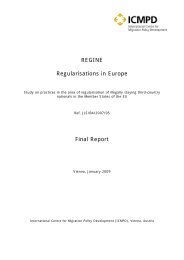European Union Enlargement - An historic opportunity
European Union Enlargement - An historic opportunity
European Union Enlargement - An historic opportunity
Create successful ePaper yourself
Turn your PDF publications into a flip-book with our unique Google optimized e-Paper software.
The EU’s Preparations for <strong>Enlargement</strong><br />
BUDGETARY ARRANGEMENTS - (SEE TABLE IN ANNEX P. 47)<br />
At its meeting in Berlin on 24-25 March 1999, the <strong>European</strong> Council confirmed that<br />
enlargement is a <strong>historic</strong> priority for the <strong>European</strong> <strong>Union</strong>, and that the accession negotiations<br />
would continue “each in accordance with its own rhythm and as rapidly as possible”.<br />
In the framework of Agenda 2000, the Berlin <strong>European</strong> Council adopted new<br />
financial perspectives for the <strong>Union</strong> in the context of enlargement, covering the period<br />
2000-2006. These perspectives make a financial provision both for pre-accession<br />
expenditure and for the first new Member States to join the EU between 2002-06.<br />
On the basis of the Berlin decisions, the total financial package agreed by EU leaders at<br />
the Copenhagen <strong>European</strong> Council in favour of the ten new Member States amounts to<br />
nearly €41 billion in terms of commitments (with €25 billion foreseen for payments) for<br />
the period 2004-2006. The largest share of this package will be to fund structural actions<br />
in the new Member States. Some €22 billion has been set aside for this purpose over<br />
the three years 2004-2006, one third of which will be for the cohesion fund and twothirds<br />
for structural funds. Almost €5 billion has been reserved for the common agricultural<br />
policy (market measures and direct payments) in the new Member States, as well<br />
as a further € 5 billion for rural development in the period 2004-2006. New Member<br />
States will also be able to benefit fully from the Community’s existing internal policies (e.g.<br />
the 5th Framework Programme on Research, education programmes such as Socrates, or<br />
the Trans-<strong>European</strong> Networks) as well as from a new transition facility to be created to continue<br />
support for reinforcing administrative capacity to implement and enforce Community<br />
legislation. The financial package also includes funds to help beneficiary countries to<br />
finance actions to implement the Schengen acquis and external border control. Additional<br />
funds are earmarked to further support nuclear safety in Lithuania and Slovakia.<br />
In addition, the Copenhagen deal also includes €2.4 billion to be paid to the new<br />
Member States in the period 2004-2006 from a temporary ‘cash-flow facility’, in order<br />
to prevent any possible cash-flow difficulties in the first years of accession, as well as<br />
temporary budgetary compensation payments of nearly €1 billion to the Czech<br />
Republic, Cyprus, Malta and Slovenia, the only new Member States for whom otherwise<br />
there would be a risk of their net budgetary position being worse on accession<br />
compared to their position in 2003.<br />
INSTITUTIONAL REFORM<br />
The Nice <strong>European</strong> Council in December 2000 was a major step towards enlargement,<br />
with agreement on a new Treaty. Its ratification in 2002 and entry into force in<br />
February 2003 has opened the way for the EU to welcome new members.<br />
Some important changes were made to streamline decision-making in an enlarged<br />
<strong>Union</strong>. These include:<br />
■ the extension of majority voting to more policy areas in the Council of Ministers,<br />
in place of decision-making by unanimity;<br />
■ a new weighting of votes of member states in the Council, to take account of the<br />
arrival of new members;<br />
■ a new allocation of seats in the <strong>European</strong> Parliament;<br />
■ an increase in authority of the President of the <strong>European</strong> Commission, in relation<br />
to the Commissioners and their portfolios.

















